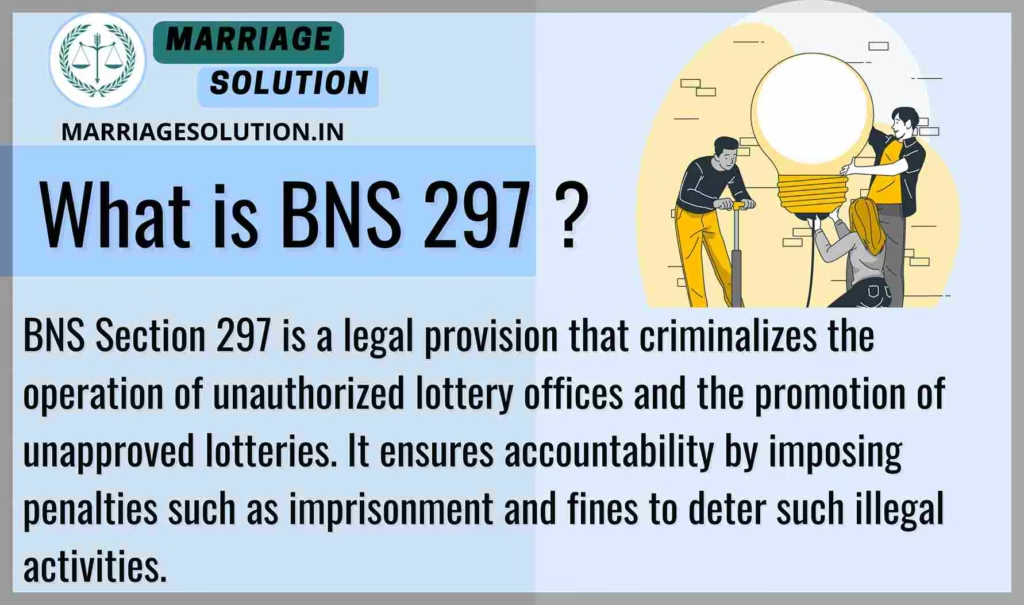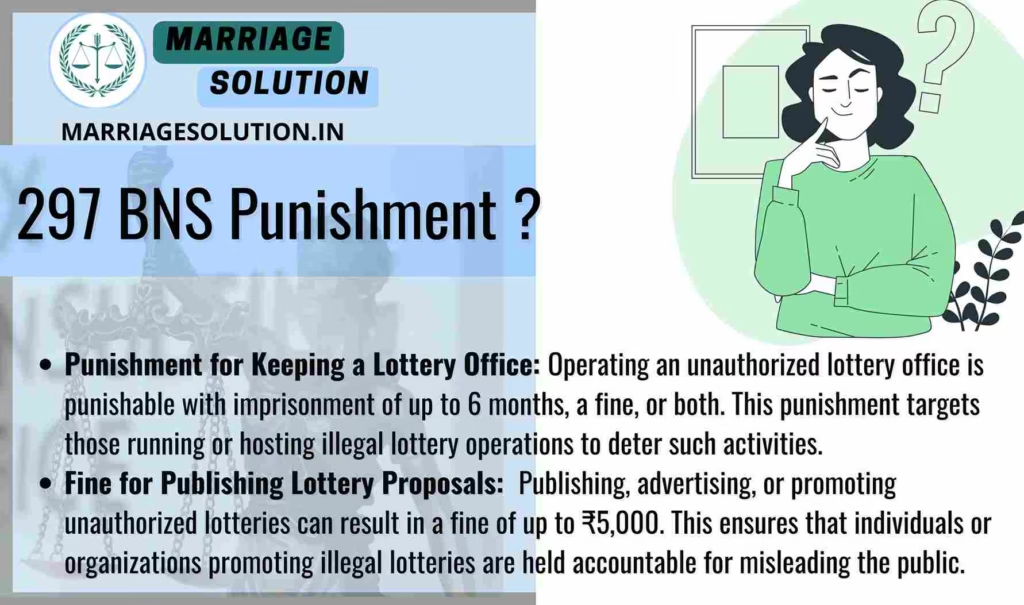Introduction of 297 BNS
297 BNS focuses on preventing unauthorized lottery operations that can mislead or exploit the public. It makes it illegal to run a lottery office without state approval or to publish advertisements and proposals for such activities. By penalizing offenders, the law protects individuals from fraudulent schemes and ensures that only state-regulated lotteries, which operate under transparency and accountability, are allowed. This section not only discourages financial exploitation but also safeguards social welfare and government revenue.
The Bharatiya Nyaya Sanhita (BNS) Section 297 replaces the old Indian Penal Code (IPC) Section 294-A.
What is BNS Section 297 ?
BNS Section 297 is a legal provision that criminalizes the operation of unauthorized lottery offices and the promotion of unapproved lotteries. It ensures accountability by imposing penalties such as imprisonment and fines to deter such illegal activities.

Under Section 297 of the bns act 2023
“Whoever keeps or uses any office or place for conducting an unauthorized lottery, or publishes any proposal or advertisement related to such a lottery, shall be punished with imprisonment up to six months, or with fine up to five thousand rupees, or with both.”
1. Meaning of Keeping Lottery Office
- This section punishes running, maintaining, or using any place for an unauthorized lottery.
- A lottery means a scheme where prizes are distributed by chance, through tickets, draws, or lots.
- It also covers publishing advertisements or proposals to promote such lotteries.
- Authorized lotteries run by the State Government are exempt.
- The law aims to stop financial exploitation, fraud, and illegal gambling.
2. Who is Covered?
This section applies to:
- Organizers – those who set up or operate unauthorized lottery offices.
- Agents/Distributors – persons selling illegal lottery tickets.
- Advertisers/Publishers – printing, posting, or circulating proposals for such lotteries.
- Promoters – individuals or groups promoting online/offline unapproved lottery schemes.
- Business Owners – landlords or managers who allow their premises to be used for illegal lottery offices.
3. Nature of the Offence
- Non-Cognizable → Police need magistrate approval to investigate/arrest.
- Bailable → Accused can get bail as a matter of right.
- Non-Compoundable → Cannot be settled privately; trial is mandatory.
- Triable by → Any Magistrate can try such offences.
4. Examples of BNS Section 297
- Example 1 – Unauthorized Office
A person runs a lottery office selling tickets for an unapproved draw. → Punishable under Section 297(1). - Example 2 – Lottery Advertisement
A group publishes posters offering cars and cash prizes in an unauthorized lottery. → Covered under Section 297(2). - Example 3 – Online Promotion
An app advertises “win prizes with lucky numbers” without state approval. → Offence under this section. - Example 4 – Authorized vs Unauthorized
A State-run lottery with government approval is legal, but a private draw with tickets is illegal.
5. Punishment under BNS Section 297
- For Keeping Lottery Office (297(1)) → Imprisonment up to 6 months, or fine, or both.
- For Publishing Lottery Proposals (297(2)) → Fine up to ₹5,000.
- Court’s discretion → Can impose both jail and fine in serious cases.
6. Importance of BNS Section 297
- Prevents fraudulent lotteries that cheat the public.
- Protects individuals from financial loss due to unregulated schemes.
- Safeguards state revenue by ensuring only government-approved lotteries operate.
- Promotes social welfare by controlling gambling-related harms.
- Reinforces that both organizers and promoters are legally accountable.
Section 297 BNS Overview
BNS Section 297 criminalizes activities related to unauthorized lotteries. This includes:
- Keeping a lottery office or place for conducting unauthorized lotteries (except state lotteries or those authorized by the state government).
- Publishing proposals related to such lotteries, like offering goods or money based on lottery outcomes.
10 Key Points of BNS Section 297
1. Unauthorized Lottery Offices Prohibited
The section prohibits anyone from keeping an office or place for the purpose of conducting a lottery unless authorized by the state. Unauthorized lotteries often operate illegally, bypassing regulations meant to protect participants and prevent fraud. Violators face imprisonment up to six months, a fine, or both.
2. Publishing Proposals Related to Lotteries
Publishing proposals, advertisements, or offers for unauthorized lotteries is a punishable offense. For example, offering prizes based on ticket numbers in an illegal lottery can lead to a fine of up to ₹5,000. This ensures that unauthorized lotteries do not exploit individuals through misleading advertisements.
3. Distinction Between Authorized and Unauthorized Lotteries
Lotteries authorized by the state or conducted as state lotteries are exempt from punishment under this section. This ensures that legally approved lotteries, which are regulated for fairness and transparency, can operate without hindrance.
4. Prevention of Fraud and Exploitation
Unauthorized lotteries are often linked to fraudulent activities, financial exploitation, and loss for participants. Section 297 safeguards the public by targeting the root of these issues: the operation and promotion of illegal lotteries.
5. Punishment for Violators
The punishment for keeping a lottery office is imprisonment up to six months, a fine, or both. For publishing lottery-related proposals, the punishment is a fine of up to ₹5,000. This ensures proportional penalties based on the nature of the offense.
6. Classification of the Offense
Offenses under Section 297 are non-cognizable (police require magistrate approval for arrest), bailable (the accused has a right to bail), and triable by any magistrate. This classification ensures a balanced approach between legal enforcement and the rights of the accused.
7. Public Awareness and Legal Safeguards
By penalizing unauthorized lotteries, the section also creates awareness about legal and illegal gambling practices. It emphasizes the importance of participating only in state-regulated lotteries to avoid legal and financial risks.
8. Role of Law Enforcement
While the offense is non-cognizable, law enforcement monitors suspicious lottery activities. If unauthorized lotteries are identified, law enforcement can seek judicial action under this section, ensuring compliance with state laws.
9. Focus on Social Welfare
Lotteries conducted without regulation can lead to gambling addiction, financial instability, and even criminal behavior. Section 297 helps curb these social harms by targeting the operation and promotion of unauthorized lottery systems.
10. Ensuring State Revenue and Transparency
State-authorized lotteries contribute to government revenue and operate under strict rules. Unauthorized lotteries bypass these systems, undermining state authority and financial transparency. Section 297 reinforces state control and ensures fairness.
Examples of BNS Section 297
1. Unauthorized Lottery Office:
A person sets up a place for selling lottery tickets without state approval and draws winners. This violates Section 297(1).
2. Advertising Unauthorized Lotteries:
An individual publishes an advertisement promising prizes based on unauthorized lottery tickets. This violates Section 297(2).
BNS 297 Punishment
- Punishment for Keeping a Lottery Office:
Operating an unauthorized lottery office is punishable with imprisonment of up to 6 months, a fine, or both. This punishment targets those running or hosting illegal lottery operations to deter such activities. - Fine for Publishing Lottery Proposals:
Publishing, advertising, or promoting unauthorized lotteries can result in a fine of up to ₹5,000. This ensures that individuals or organizations promoting illegal lotteries are held accountable for misleading the public.

BNS 297 bailable or not ?
Yes, offenses under BNS Section 297 are bailable, meaning the accused can seek bail as a matter of right. The section classifies the offense as non-cognizable, so police action requires magistrate approval.
Comparison: BNS Section 297 vs IPC Section 294-A
| Section | What it Covers | Punishment / Fine | Exceptions | Bailable / Cognizable | Trial By |
|---|---|---|---|---|---|
| BNS Section 297 | Prohibits keeping or operating unauthorized lottery offices and publishing or promoting advertisements for such lotteries without state approval. Ensures transparency and protects the public from fraudulent schemes. |
(1) For keeping a lottery office → Imprisonment up to 6 months, or fine, or both. (2) For publishing proposals → Fine up to ₹5,000. |
State-authorized lotteries are exempt. Applies only to unauthorized or unapproved lottery operations. | Bailable & Non-Cognizable | Any Magistrate |
| IPC Section 294-A (Old) | Penalized the operation or advertisement of unauthorized lotteries. Focused on traditional, non-digital lottery activities and schemes. | Imprisonment up to 6 months, or fine, or both. Fine amount was not specifically defined in the old code. | No express exemptions for state-authorized lotteries; interpretation evolved through judicial practice. | Bailable & Non-Cognizable | Any Magistrate |
| Key Difference: BNS Section 297 refines IPC Section 294-A by distinguishing between keeping a lottery office and publishing proposals, introducing specific fine limits and explicitly covering digital or online promotions. It enhances public protection and state regulation in modern contexts. | |||||
BNS Section 297 FAQs
What is the main focus of Section 297?
It penalizes unauthorized lottery operations, including running lottery offices or publishing lottery-related proposals.
What is the maximum punishment for keeping a lottery office?
The maximum punishment is 6 months imprisonment, a fine, or both.
What fine is imposed for publishing lottery proposals?
A fine of up to ₹5,000 can be imposed for advertising or promoting unauthorized lotteries.
Is an offense under Section 297 bailable?
Yes, offenses under this section are bailable, allowing the accused to apply for bail.
Who can try offenses under Section 297?
Any magistrate is authorized to try cases under this section.
Conclusion
BNS Section 297 plays an important role in regulating gambling and preventing misuse of lotteries. By prohibiting unauthorized lottery offices and advertisements, the law ensures that people are not misled by fraudulent schemes. At the same time, it supports transparency in state-approved lotteries, which contribute to public welfare and revenue generation. With punishments that include fines and imprisonment, Section 297 serves as a safeguard against exploitation and protects citizens from the financial and social risks linked with illegal lotteries.
Need Legal Support?
If you are dealing with court cases, marriage problems, or any other legal issue, our team at Marriage Solution – Lawyer Help is here for you. Simply fill out our quick online enquiry form, and we’ll connect you with the right legal expert to support your needs.
Finished with BNS 297 ? Continue exploring the next provisions of the Bharatiya Nyaya Sanhita (BNS), 2023. Each section includes explanations, examples, and plain-language breakdowns for easy understanding.
CHAPTER XVI OF OFFENCES RELATING TO RELIGION
- BNS 298 : Injuring or defiling place of worship, with intent to insult the religion of any class.
- https://marriagesolution.in/bns_section/bns-298/
- 299 BNS : Deliberate and malicious acts, intended to outrage religious feelings of any class by insulting its religion or religious beliefs.
- https://marriagesolution.in/bns_section/299-bns/
- 300 BNS :Disturbing religious assembly.
- https://marriagesolution.in/bns_section/300-bns/
- 301 BNS :Trespassing on burial places, etc.
- https://marriagesolution.in/bns_section/301-bns/
Full IPC Section List: https://marriagesolution.in/ipc-section-list
All Indian Law & Blogs: https://marriagesolution.in/indian-law/
Full BNSS Section List: https://marriagesolution.in/bnss_section-list
